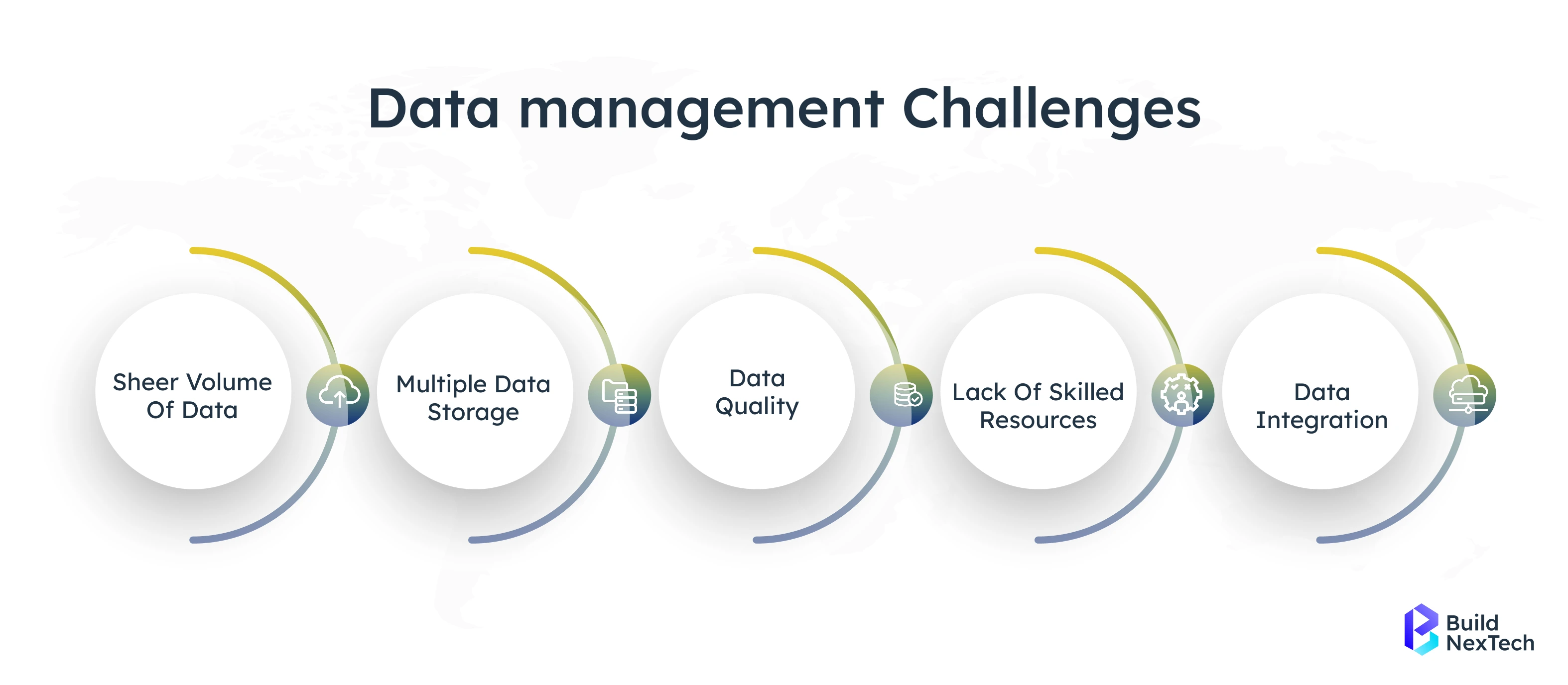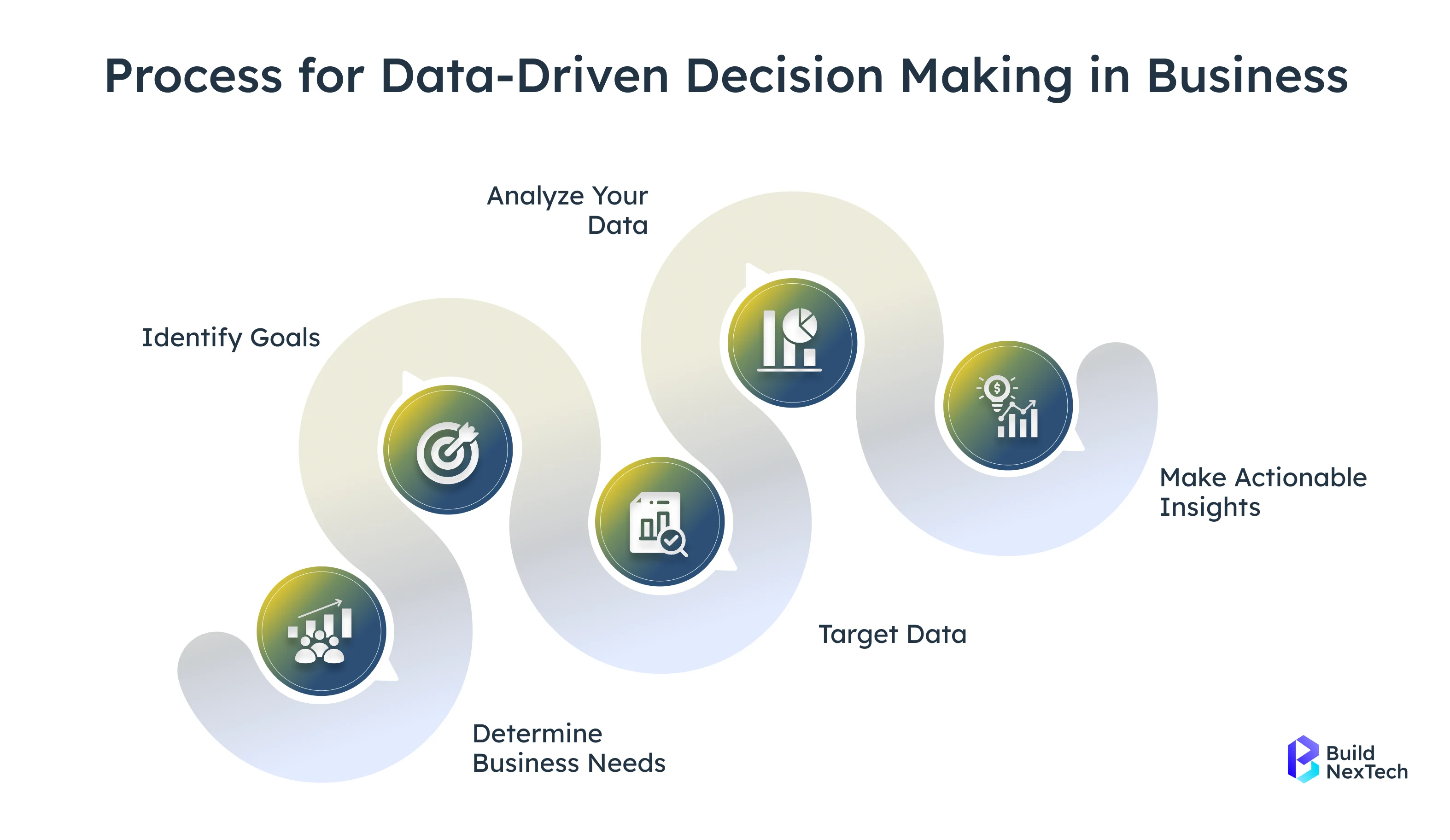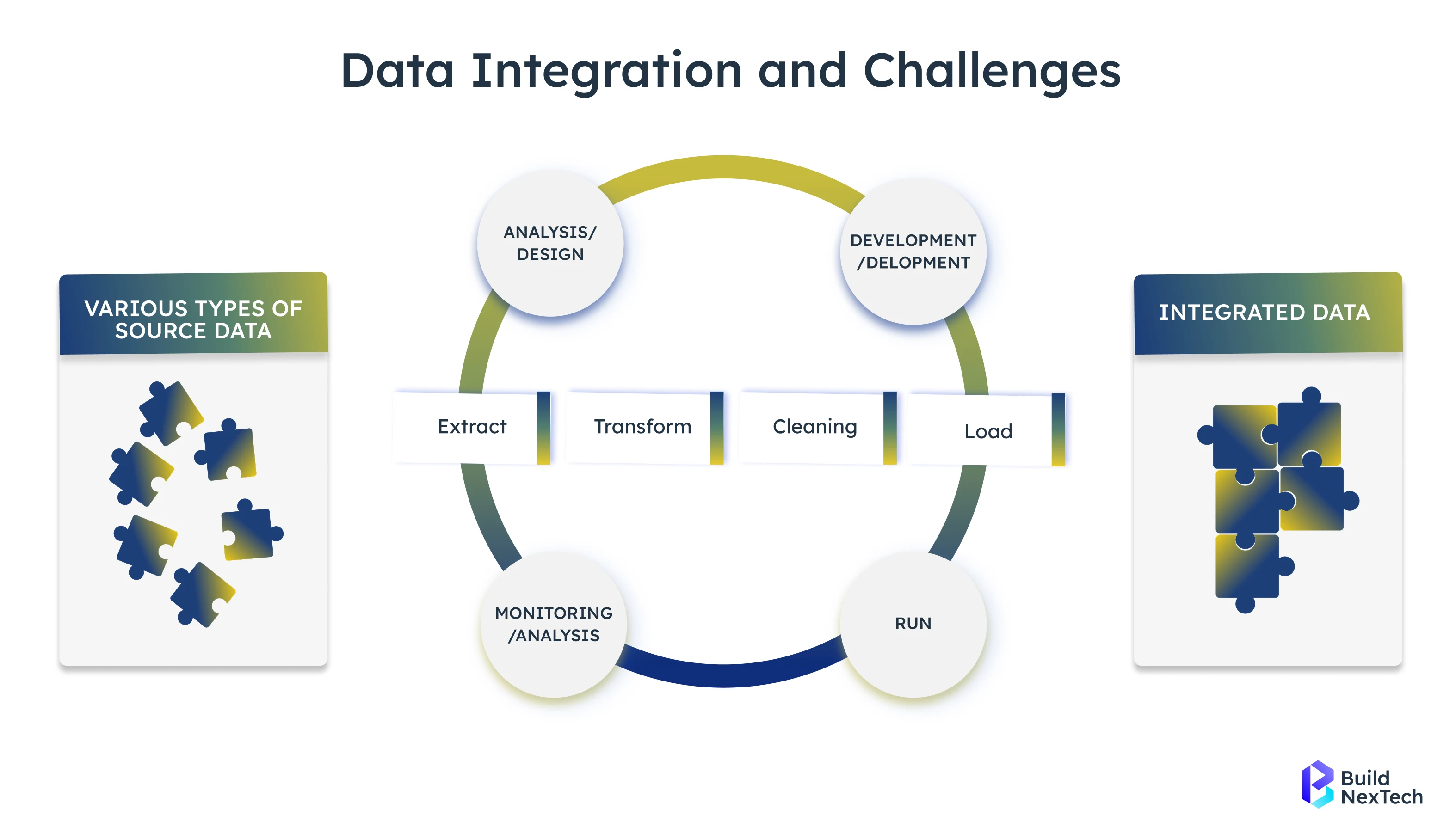Modern businesses run on data — but turning that data into value isn’t easy. As information pours in from CRMs, IoT devices, and open data sources, complexity grows faster than clarity. That’s where data engineering consulting comes in, helping organizations convert raw information into actionable insights while maintaining strong data security, data protection, and consistent data lifecycle management.
Outsourcing provides access to advanced tools like Microsoft technologies, Azure Data Factory, Power BI, and Data marts, supported by expert machine learning engineers and developers skilled in .NET Core, Node.js, and Express.js. With proven data encryption techniques, robust security measures, and proper team access controls, businesses achieve reliability and compliance. Ongoing training sessions, performance monitoring, and measurable results from partnership ensure continuous improvement.
This blog covers:
- Why in-house data management fails to scale
- Core data challenges slowing business growth
- Strategic benefits of outsourcing data engineering
- Key services offered by data engineering consultants
- Steps for a smooth and successful outsourcing journey
Why In-House Data Management Fails to Scale
As data velocity grows, internal systems and teams struggle to keep up. Legacy databases, manual ETL processes, and siloed tools make it difficult to scale analytics. Maintaining an on-premises data center facility with dedicated staff is costly — especially when serverless components and cloud-native options offer greater efficiency.
Moreover, many businesses lack specialised talent. Without skilled Python, SQL, Java, Golang, Django, Spring Boot, or PHP developers, internal teams struggle to design robust data pipelines or seamlessly integrate APIs, limiting the efficiency and scalability of their data operations. The absence of expertise in areas like what is feature engineering in data science also limits their ability to refine data for advanced analytics and data-driven advertising, preventing organisations from unlocking the full value of their data.
Outsourcing to a data engineering consulting company offers agility, efficiency, and expertise — enabling businesses to implement modern cloud architectures, embrace what is data driven advertising strategies, and drive operational efficiencies at scale.
Core Data Challenges Hindering Business Growth
Many organisations struggle to define data engineering and fully grasp what is data engineering?, leading to disjointed data systems and limited analytical value. Without a clear understanding of essential data analysis types, businesses often fail to extract meaningful insights—hindering growth, innovation, and strategic decision-making.
Enterprises face multiple data hurdles that stifle innovation and insight:
- Siloed systems across relational and non-relational databases
- Poor data quality standards and lack of data validation techniques
- Inconsistent governance and security protocols
- Delays in data flow due to inefficient data ingestion
- Manual data cleaning tools slowing analysis

Without a strong data foundation, it’s nearly impossible to implement predictive analytics, understand customer behavior, or ensure regulatory requirements compliance.
How Data Complexity Impacts Business Decision-Making
When data is fragmented, businesses lose their ability to compare data, derive insights, or react to changes. Reports become outdated, and forecasting models suffer from bias or error.
Without consistent data governance frameworks and data access controls, even advanced tools can produce unreliable outcomes. This not only affects data recovery disk operations but also increases risks associated with compliance breaches.

A specialised data engineering services company makes sure to follow standards for data quality, validation, and governance. This improves reliability, consistency, and trust in every data-driven decision.
Key Services Offered by Data Engineering Consultants
Modern data engineering consultants deliver a full suite of solutions designed to optimise data flow and insight generation. They build and manage robust data engineering pipelines that ensure seamless data movement from collection to analysis.
Top data pipeline consulting service providers also integrate AI capabilities—proving that AI can analyze data effectively to uncover patterns and predictions. Through outsourced data engineering services, businesses gain access to scalable expertise, advanced tools, and continuous optimization without the overhead of in-house management.
Data engineering consultants deliver a comprehensive suite of services designed to modernise your enterprise data architecture.
From Data Integration to Real-Time Analytics
Here’s what leading consultants offer:
- Data Integration and ETL Processes: Create data pipelines through modern tools and serverless architectures, handling ingestion, transformation, and storage.
- Data Warehouses & Data Lakes: Creating scalable storage using Data Lakes or Delta Lake, and Data Vault architectures, for a unified and structured approach to analytics.
- Data Quality & Governance: Defining data quality standards, applying data validation techniques, and developing an effective data governance framework.
- Feature Engineering and Modeling: Establishing a definition of feature engineering in data science and preparing the rich features for prediction models and predictive analytics.
- Big Data Management and Governance: Using frameworks that ensure big data analytics solutions comply with governance, security, and data foundation standards.
- Cloud Deployment & Integration: Implementing data engineering on Google Cloud Platform, Azure Data Services, and data engineering with AWS using Web APIs and serverless components.
- Automation & DevOps: Using Azure DevOps and Azure App Service to enhance CI/CD processes for data and analytics pipelines.
- Business Intelligence (BI): Providing BI solutions and cloud BI platforms for collecting stakeholders' data visualisation and automated dashboards.
- Data Science & AI Integration: Utilizing data science services and data science with machine learning to develop intelligent predictive models for trend forecasting and improved customer feedback analysis.

These services help organisations use their data in daily work. They improve analytics. They speed up digital transformation.
Strategic Benefits of Outsourcing Data Engineering
Outsourcing data engineering enables businesses to streamline operations and focus on innovation while experts handle the technical foundation. By leveraging specialists who understand what is data pipeline in data engineering, organisations can ensure efficient data flow and integration across platforms.
Combined with advanced data capturing tools and comprehensive data coverage maps, outsourced teams help improve accuracy and scalability. They have also utilised the correct types of analysis of the data to provide insight that is not only actionable, it also drives timely and strategic decisions.
Working with the best data engineering consultants for enterprises provides measurable benefits, both strategically and operationally:
- Infrastructure in the cloud that scales: Outsourcing data engineering, whether the data is in the Google Cloud Platform, data engineering with AWS or Azure Data Services, makes scaling and optimizing performance seamless.
- Advanced expertise: Provide professionals in engineering data, structuring data pipelines, Data Vault, Delta Lake, and ETL processes.
- Insights in faster time: Automated dashboards and actionable cloud business intelligence dashboards provide opportunities for real time visualisation and faster decisions.
- Improved compliance & data security: Experts can optimise your agency’s ability to comply with regulatory requirements through secure methodologies, data access protocols, and encryption and security before mechanisms like the AWS Cognito and Blob Storage.
- Lower operational costs: You can leverage data engineering outsourcing company pricing models that are flexible and predictable without internal infrastructures.
- End-to-end lifecycle management: consultants handle data ingestion, storage, data cleaning, data transformation, data analytics, and sufficiency to optimise your full data lifecycle.
Overall, leveraging a cloud ecosystem for your business will modernise your business and secure your data strategy for the future.
Selecting the Best Data Engineering Partner
When selecting a data engineering partner, look for one that truly understands what does data engineering do—building scalable systems that turn complex data into business intelligence. The right partner leverages AI to demonstrate how AI can analyze data, uncovering deeper insights that power smarter decisions. By combining the big data analytics benefits with innovative approaches like data-driven advertising, top consultants help businesses maximise ROI and maintain a competitive edge in a data-first world.
Choosing a data engineering consulting company is a critical strategic decision. Look for these essential qualities:
- Proven Track Record: Engage top data engineering consultants for enterprises with industry experience in Data Analytics Services, Analytics Consulting, and big data analytics solutions.
- Technical Expertise: Be certain that the partner excels in SQL Server, as well as Amazon Web Services, Azure Data Services, and Google Cloud Platform.
- Full-Stack Functionality: You want a partner who can handle every aspect of data ingestion to visualization, including Data Warehouses, Data Vaults, and Data Lakes.
- Talent Pool: Ensure the organization has talented Python Developers & SQL Developers, and Java developers, Golang developers, Django developers, Spring Boot Developers, and PHP developers for backend, API, and Data Engineering development.
- Security & Compliance: Proper security, policies, and access control should have been established to protect sensitive information in your cloud and data analytics environment.
- Cost Transparency: Review the pricing structures of data engineering outsourcing firms to provide options that will be in alignment with your financial perspective.
- Knowledge Transfer: Successful data engineering consulting companies provide significant documentation, workshops, and Knowledge transfer capability to internal teams.
Outsourcing allows you to focus on business strategy while they focus on the technical delivery and adherence to compliance.
H2-Case Studies: Real-World Data Transformation
Case Study 1: Retail Supply Chain Optimization
A global retailer partnered with a data engineering service provider to migrate its legacy SQL Server infrastructure to Azure Data Services. By implementing a Delta Lake over Data Lake Storage and deploying automated dashboards, the company enhanced demand forecasting accuracy by 40% and improved supply chain visibility.
Key Outcomes:
- Achieved a 35% reduction in inventory waste through better demand insights.
- Enabled 2× faster decision-making with real-time analytics and reporting.
Case Study 2: Healthcare Data Integration and Compliance
A healthcare organization unified patient data from multiple relational and non-relational databases using data engineering on GCP. With robust data validation techniques and data quality standards, it maintained HIPAA compliance while enabling faster predictive analytics.
Key Outcomes:
- Improved data governance efficiency by 45% through automated validation.
- Accelerated clinical insights, reducing diagnosis time by 30%.
Case Study 3: Fintech Risk Management Transformation
A fintech company adopted data engineering with AWS and AWS Cognito for secure authentication. By integrating Web APIs, Azure DevOps pipelines, and Blob Storage, it automated fraud detection workflows, cutting queue time by 30%.
Key Outcomes:
- Increased fraud detection accuracy by 50% through automation.
- Enhanced transaction security, boosting customer trust by 25%.
Executing the Transition: Steps for a Smooth Outsourcing Journey
A successful outsourcing journey begins with choosing the right enterprise data engineering partner who understands your business goals and analytics needs. Through managed data engineering services for analytics, organisations can ensure seamless integration, minimal disruption, and faster value realization. By leveraging AI capabilities to answer can AI analyze data, and aligning insights with data driven advertising strategies, businesses can achieve a smooth transition that enhances performance and scalability.
To ensure a seamless transition to outsourced data engineering, follow these structured steps:
- Assess the Current Data Landscape: Identify pain points in your data managing, ETL processes, and architecture.
- Define Clear Objectives: Clarify your goals — whether to enhance predictive analytics, migrate to Data Lakes, or implement BI solutions — to fully leverage big data analytics benefits and drive measurable business outcomes.
- Select the Right Partner: Hire a data engineering consulting company experienced in cloud, DevOps, and analytics consulting.
- Plan Migration and Security: Implement security protocols, data governance frameworks, and data recovery disk policies to prevent loss and ensure compliance.
- Implement and Automate: Leverage GCP data engineering alongside tools like Azure App Service, serverless components, and Web APIs to streamline workflows. This approach automates complex processes, reduces manual intervention, and enhances overall operational efficiency across data-driven environments.
- Facilitate Knowledge Transfer: Provide post-deployment knowledge transfer sessions to enable the smooth transition to internal adoption.
- optimise Continuously: Assess analytics, customer feedback, and performance metrics to iterate and drive continued value.
This systematic approach ensures that outsourcing leads to stability, innovation, and measurable returns.
Conclusion: Turning Data into a Strategic Advantage
Data has evolved from a passive resource into a driving force behind business innovation. By outsourcing to the best data engineering consulting companies, organisations gain clarity, control, and competitiveness. Whether you’re modernizing with Azure Data Services, data engineering with AWS, or data engineering on Google Cloud Platform, outsourcing enables seamless integration of Data Vaults, Data Lakes, and BI solutions.
Through cloud-native tools like Azure DevOps, AWS Cognito, Blob Storage, and Web APIs, enterprises can secure, automate, and scale their data ecosystems. The process often begins with a discovery meeting, followed by a custom proposal, contract finalization, and solution implementation using agile project management principles. Application Modernization, Data Platform Modernization, and better supply chain management support businesses. These Best outsourced data engineering services help businesses reach full efficiency.
Combined with a strong data governance framework, advanced security measures, and continuous data validation techniques, outsourcing transforms complexity into clarity.With the right data engineering services company, your business can find useful insights. It can improve operations. It can carry out a future-focused business plan based on data intelligence.
People Also Ask
How can data engineering consulting improve ROI for businesses across industries?
Data engineering consulting streamlines data workflows, reduces manual effort, and enhances decision accuracy. By turning raw data into actionable insights, businesses achieve faster growth and measurable ROI.
What factors should companies consider before outsourcing their data engineering needs?
Organisations should assess data complexity, compliance requirements, and desired outcomes. Choosing a partner with proven expertise in cloud platforms and analytics tools ensures long-term value.
How does outsourced data engineering support data security and regulatory compliance?
Trusted partners implement robust data security measures, encryption techniques, and governance frameworks. This ensures compliance with industry regulations while maintaining data integrity.
What are the cost advantages of partnering with a data engineering services company versus hiring in-house teams?
Outsourcing reduces hiring and infrastructure costs while providing access to specialised skwills and advanced technologies. It enables scalability without long-term operational overhead.



























.webp)
.webp)
.webp)

